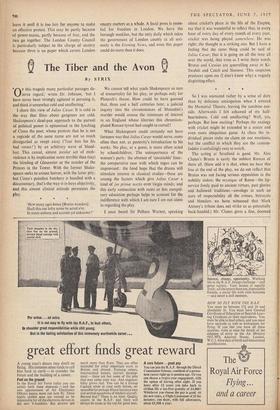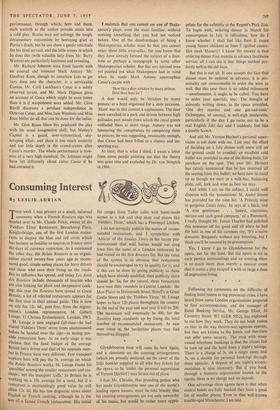(2 The Tiber and the Avon By STRIX F this
tragedy many particular passages de- kf serve regard,' wrote Dr. Johnson, 'but I have never been strongly agitated in perusing it, and think it somewhat cold and unaffecting.' I share this view of Julius Ctesar. It is cold in the way that films about gangsters are cold. Shakespeare's dead-pan approach to the pursuit of political power is epitomised in the lynching. of Cinna the poet, whose protests that he is not a regicide of the same name are not so much disregarded as swept away (`Tear him for his bad verses!') by an arbitrary wave of blood- lust. This casual, almost jocular act of mob- violence is by implication more terrible than (say) the blinding of Gloucester or the murder of the Princes in the Tower. With the former Shake- speare seeks to arouse horror, with the latter pity; but Cinna's pointless butchery is handled with a documentary, that's-the-way-it-is-boys objectivity,, and this almost clinical attitude permeates the play.
`How many ages hence [Brutus wonders] Shall this our lofty scene be acted o'er, In states unborn and accents yet unknown?' We cannot tell what made Shakespeare so sure of immortality for his play, or perhaps only for Plutarch's theme. How could he have guessed that, three and a half centuries later, a judicial inquiry into the circumstances of Mussolini's murder would arouse the minimum of interest in an England whose liberties this chromium- plated Roman tyrant had sought to curtail?
What Shakespeare could certainly not have foreseen was that Julius Cauar would serve, more often than not, as posterity's introduction to his works. No play, at a guess, is more often acted by schoolchildren. The unimportance of the women's parts : the absence of 'unsuitable' lines ; the comparative ease with which togas can be improvised : the fond hope that the drama will stimulate interest in classical studies—these are among the factors which give Julius Cresar a kind of /us prima noctis over virgin minds; and this early connection with more or less compul- sory education perhaps helps to account for the indifference with which I am sure I am not alone in regarding the play.
I once heard Sir Pelham Warner, speaking about cricket's place in the life of the Empire, say that it was wonderful to reflect that, in every hour of every day of every month of every year, cricket was being played somewhere. He was right; the thought is a striking one. But I have a feeling that the same thing could be said of Julius Cavar, that it is going on all the time all over the world, that even as I write these words Brutus and Cassius are quarrelling away in Ki- Swahili and Czech and Siamese. This suspicion produces upon me (I don't know why) a vaguely dispiriting effect.
So I was animated rather by a sense of duty than by delicious anticipation when I entered the Memorial Theatre, leaving the sunshine out- side. Afterwards I felt ashamed of thy half- heartedness. Cold and unaffecting? Well, yes, perhaps. But how exciting! Perhaps the analogy with cricket might be extended to a senior and even more ubiquitous game. At chess the in- dividual pieces stake no claim on our emotions, but the conflict in which they are the cannon- fodder is unfailingly easy to watch.
The. acting at Stratford is good. Mr. Alec Clunes's Brutus is easily the noblest Roman of them all. (How odd it is that, when we hear this line at the end of the play, we do not reflect that Brutus was not facing serious opposition in the nobility stakes; the mystique of Rome—the lip- service freely paid to ancient virtues, past glories and hallowed traditions—envelops in such an aura of respectability all the crimes, betrayals and blunders we have witnessed that Mark Antony's tribute does not strike us as potentially back-handed.) Mr. Clunes gives a fine, doomed performance, through which, here and there, such warmth as the author permits steals into a cold play. Brutus may not infringe the tough, documentary convention by betraying grief at Portia's death, but he can show a gentle solicitude for his tired servant, and the little scenes in which he does this (with valuable help from Mr. Barry Warren) are particularly luminous and revealing.
Mr. Richard Johnson wins fresh laurels with an assured and resonant Mark Antony. Mr. Geoffrey Keen, though he somehow fails to get very deep into the character, is a serviceable Cassius, Mr. Cyril Luckham's Cxsar is a subtly observed tyrant, and Mr. Mark Dignam gives an account of Casca which might be. even better than it is if waspishness were added. Mr. Clive Revill discovers a petulant independence in Octavius Cwsar, and Miss Jane Wenham and Miss Joan Miller do all that can be done for the ladies.
Mr. Glen Byam Shaw has produced the play with his usual imaginative skill; but Motley's Capitol is a gaunt, over-symmetrical, sky- scraping affair, and there is too much austerity and too little depth in the crowd-scenes after Caesar's murder. The whole performance is how- ever of a very high standard; Dr. Johnson might have felt differently about Julius Ceesar if he had attended it. I maintain that you cannot see any of Shake- spear4 plays, even the most familiar, without noticing something that you had not noticed before. One of the disadvantages of being a Shakespearian scholar must be that you cannot enjoy these little trouvailles, for you know that they have already formed the subject of a foot- note or perhaps a monograph by some other Shakespearian scholar. But has any learned man yet pointed out what Shakespeare had in mind when he made Mark Antony apostrophise Cresar's corpse with :
'How like a deer stricken by many princes Dost thou here lie"?
A deer would only be 'stricken by many princes' at a hunt organised for a state occasion. 'Hunt' was in this context a euphemism. The deer were corralled in a park and driven between high palisades past stands from which the royal guests enfiladed them at short range. Antony was not honouring the conspirators by comparing them to princes; he was suggesting, reasonably enough, that Caesar had been killed in a clumsy and un- sporting way.
At least, that is what I think. I await a letter from some pundit pointing out that the theory was gone into and exploded by Dr. von Nittpich in 1904.



































 Previous page
Previous page